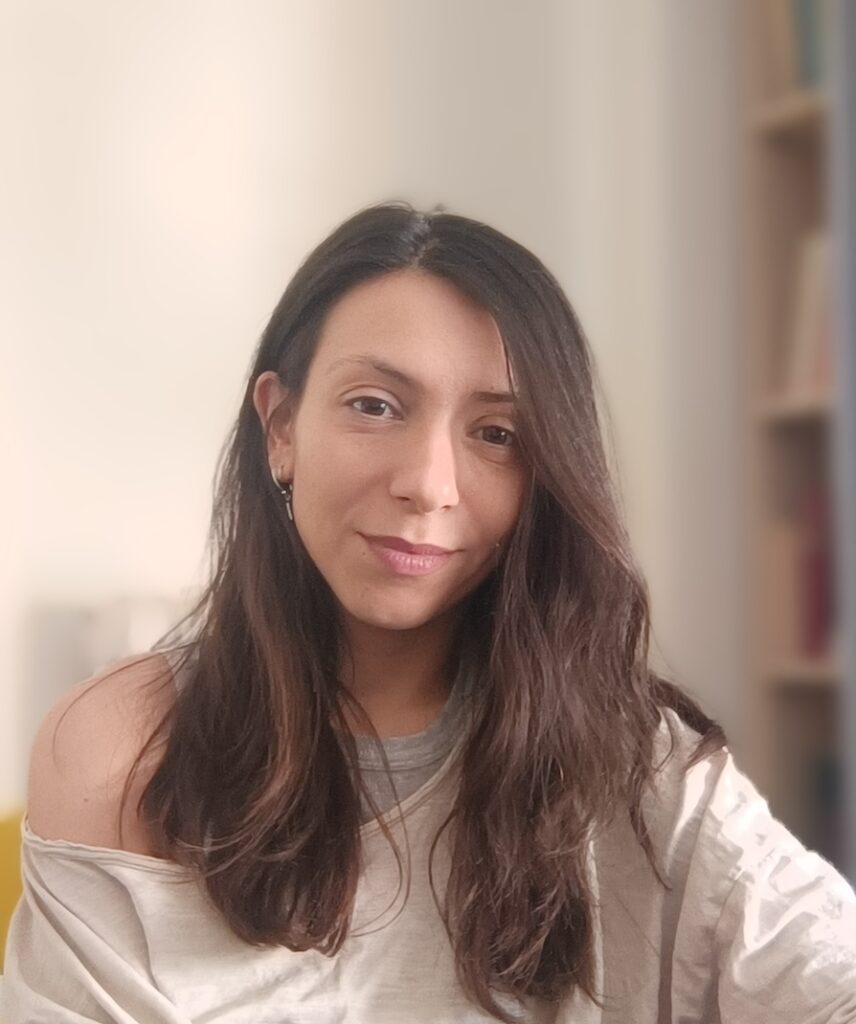
Ms Eleni Tsatsaroni
Ph.D. candidate in Sociology, National and Kapodistrian University of Athens
Eleni Tsatsaroni is a Ph.D. candidate in Sociology at the National and Kapodistrian
University of Athens and a Researcher at the Institute of Informatics and
Telecommunications, NCSR Demokritos. Drawing on affect theory, she investigates digitality
and the emerging subjectivities shaped by affective human-non-human interactions. At
NCSR Demokritos, she works as an AI Education and Training Officer, designing and
implementing educational programs that make complex technological concepts accessible
and engaging for diverse audiences. Her research and practice are driven by a commitment
to rethinking subjectivity more inclusively.
Ms Eleni Tsatsaroni presents her work at the Young Scholars Session.
Title: Children Voicing Concerns: Imagining AI Futureworlds, Rethinking Subjectivity
Authors: Eleni Tsatsaroni (Presenting Speaker), Amalia Giannoutsou
Abstract: Science fiction has long served as a lens through which human existence is questioned and reimagined. Through the equivocal subjectivities presented in science fiction, each era confronts the non-normative Others of its social reality, challenging the very idea of humanness. As perceptions of the human condition mutate within space and time, the subject matter of science fiction is also changing. In an ever-changing world, where postcolonial and posthuman discourse increasingly challenges the notion of humanness - calling it out for being too narrow to fit a wide range of identities, including cultural otherness, disability, and queerness- childness has similarly been diminished. Often equated with immaturity, meaninglessness, and lack of direction, children are frequently excluded from conversations about subjectivity. This paper argues for the importance of recognizing children’s voices as bearing meaning and equally including them at the heart of the efforts to redefine humanness. This paper draws on the research experience of the educational program “Familiarization with Artificial Intelligence”, designed by ahedd DIH of the National Center for Scientific Research Demokritos and implemented as an interactive workshop for 5th-grade students at the Ralleion Experimental Schools of Athens University, from February to March 2025. Combining experiential learning with critical thinking, the program approached Artificial Intelligence (AI) both as a technological artifact and a social phenomenon. It aimed to cultivate critical thinking around key issues of digitality by highlighting AI’s ethical, environmental, and cultural dimensions. The program culminated in a series of science fiction essays, through which the students navigated their visions of the future. Building on the narratives created by the students, the paper explores how children, through imaginative storytelling, engage with the question of What it Means to Be Human in the age of AI and technological innovation. The stories crafted by the participants introduce the readers to heterogeneous futuristic societies that oscillate between eutopias and dystopias. Embedded within a framework that entangles the politics of emotion with future studies and narratology from a decolonial perspective, this study analyses how these heterotopias, inhabited by artificially constructed subjects, problematize the notions of embodiment, identity, and community. We argue that the storyworlds imagined by the children not only reflect the sociocultural conditions of the world in which they were created, but also actively unveil the features of the technological culture of postmodernity. Ultimately, they shed light on how children experience and interpret the present and reveal the values, morals, hopes, and fears that shape their understanding of subjectivity in an increasingly digitized world, while simultaneously setting in motion alternative imaginaries as possibilities for the future.
Amalia Giannoutsou | Ph.D. in Education, Ralleios Experimental Schools of Athens University. Amalia Giannoutsou is a researcher, educator, and pedagogical assessor in differentiated learning strategies at the Ralleios Experimental Schools of Athens University. Her work explores the role of memory and imagination in children’s identity construction and agency, particularly how children’s engagement with storytelling encourages critical reflections on social transformation by producing alternative visions of identity, community, and the future. She holds a PhD in Education from the Autonomous University of Barcelona. Since 2022, she has been collaborating with the University of Edinburgh as a researcher on Windows on the World, a community, art-based research project in refugee camps in Greece.
Ms Eleni Tsatsaroni presents her work at the Young Scholars Session.
Title: Children Voicing Concerns: Imagining AI Futureworlds, Rethinking Subjectivity
Authors: Eleni Tsatsaroni (Presenting Speaker), Amalia Giannoutsou
Abstract: Science fiction has long served as a lens through which human existence is questioned and reimagined. Through the equivocal subjectivities presented in science fiction, each era confronts the non-normative Others of its social reality, challenging the very idea of humanness. As perceptions of the human condition mutate within space and time, the subject matter of science fiction is also changing. In an ever-changing world, where postcolonial and posthuman discourse increasingly challenges the notion of humanness - calling it out for being too narrow to fit a wide range of identities, including cultural otherness, disability, and queerness- childness has similarly been diminished. Often equated with immaturity, meaninglessness, and lack of direction, children are frequently excluded from conversations about subjectivity. This paper argues for the importance of recognizing children’s voices as bearing meaning and equally including them at the heart of the efforts to redefine humanness. This paper draws on the research experience of the educational program “Familiarization with Artificial Intelligence”, designed by ahedd DIH of the National Center for Scientific Research Demokritos and implemented as an interactive workshop for 5th-grade students at the Ralleion Experimental Schools of Athens University, from February to March 2025. Combining experiential learning with critical thinking, the program approached Artificial Intelligence (AI) both as a technological artifact and a social phenomenon. It aimed to cultivate critical thinking around key issues of digitality by highlighting AI’s ethical, environmental, and cultural dimensions. The program culminated in a series of science fiction essays, through which the students navigated their visions of the future. Building on the narratives created by the students, the paper explores how children, through imaginative storytelling, engage with the question of What it Means to Be Human in the age of AI and technological innovation. The stories crafted by the participants introduce the readers to heterogeneous futuristic societies that oscillate between eutopias and dystopias. Embedded within a framework that entangles the politics of emotion with future studies and narratology from a decolonial perspective, this study analyses how these heterotopias, inhabited by artificially constructed subjects, problematize the notions of embodiment, identity, and community. We argue that the storyworlds imagined by the children not only reflect the sociocultural conditions of the world in which they were created, but also actively unveil the features of the technological culture of postmodernity. Ultimately, they shed light on how children experience and interpret the present and reveal the values, morals, hopes, and fears that shape their understanding of subjectivity in an increasingly digitized world, while simultaneously setting in motion alternative imaginaries as possibilities for the future.
Amalia Giannoutsou | Ph.D. in Education, Ralleios Experimental Schools of Athens University. Amalia Giannoutsou is a researcher, educator, and pedagogical assessor in differentiated learning strategies at the Ralleios Experimental Schools of Athens University. Her work explores the role of memory and imagination in children’s identity construction and agency, particularly how children’s engagement with storytelling encourages critical reflections on social transformation by producing alternative visions of identity, community, and the future. She holds a PhD in Education from the Autonomous University of Barcelona. Since 2022, she has been collaborating with the University of Edinburgh as a researcher on Windows on the World, a community, art-based research project in refugee camps in Greece.
